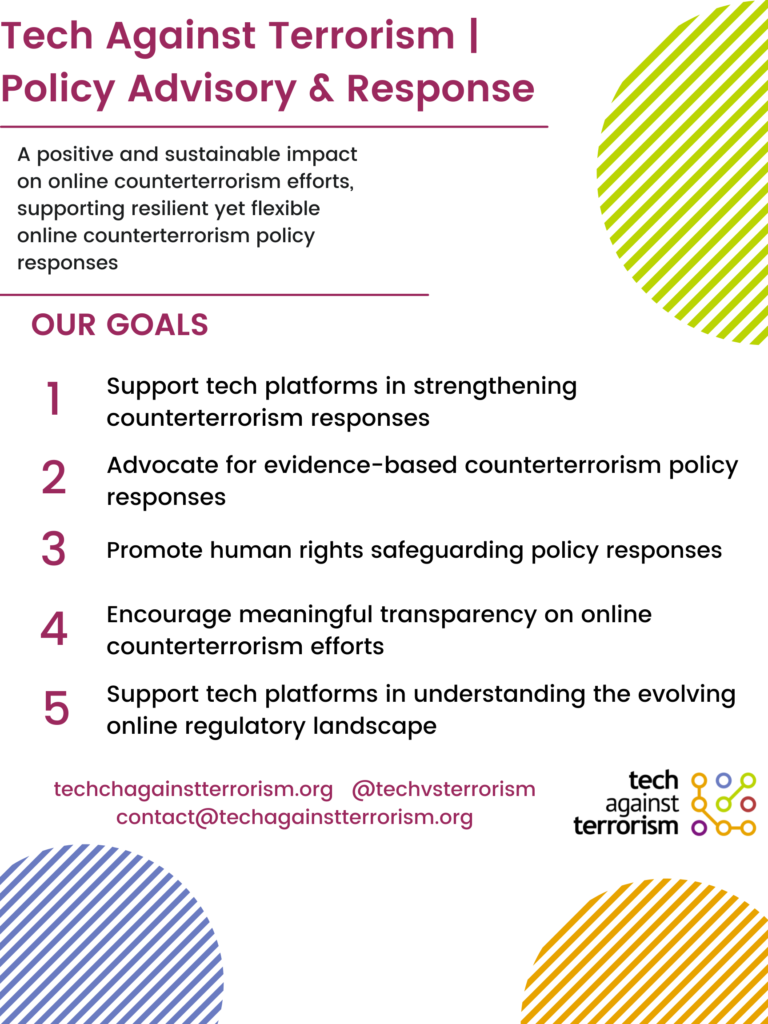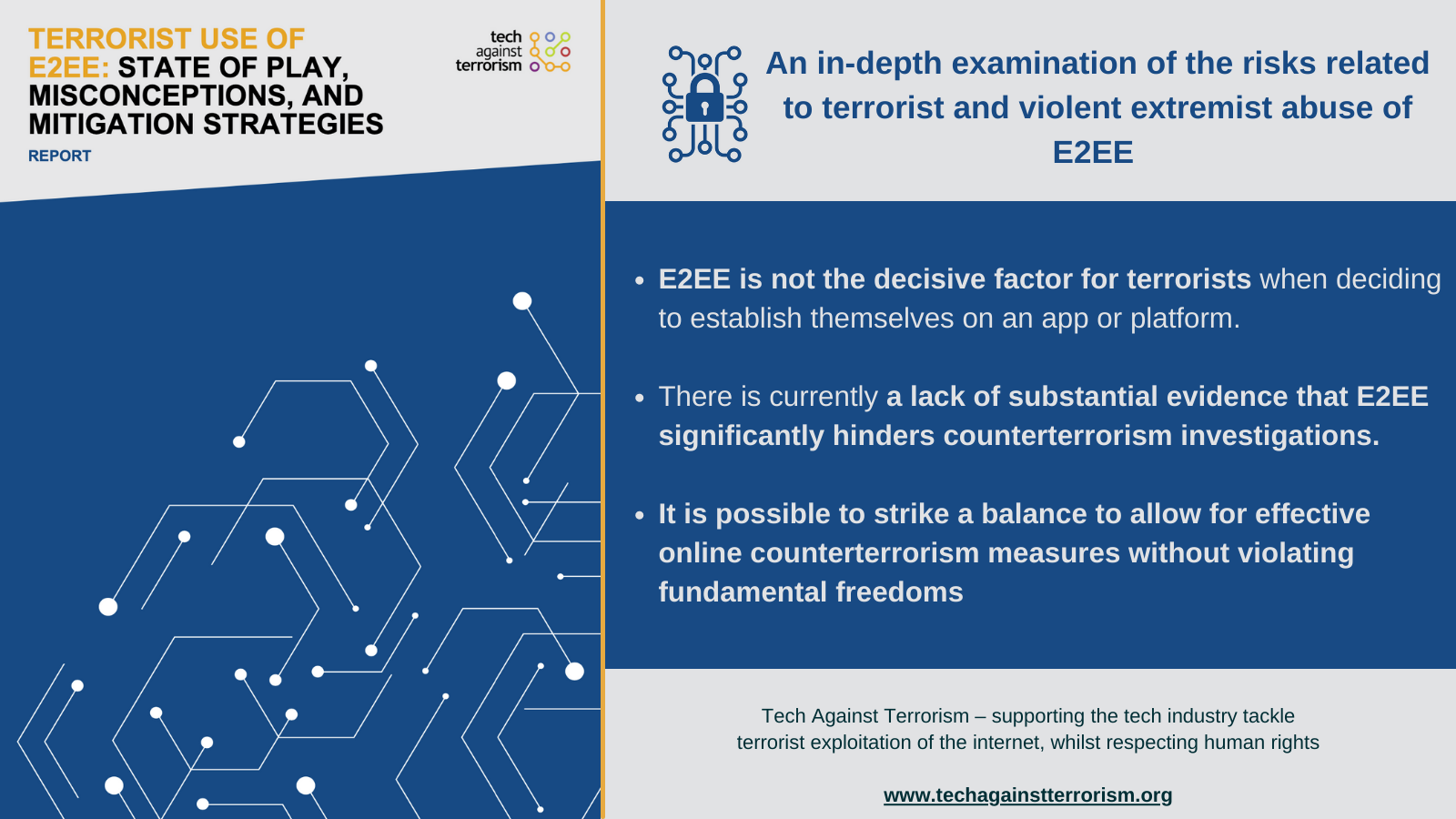Headline news
- In December, we organised a webinar in partnership with the United Nations Counter Terrorism Executive Directorate (UNCTED) on how intergovernmental organisations can support the tech sector in countering terrorist use of the internet whilst respecting human rights. This webinar focused on cooperation between the UN and smaller tech platforms in countering use of the internet for terrorist purposes, and saw flash introductions from UN CTED, UNODC, UNOCT, UNOHCHR, UNICRI, and UNDP.
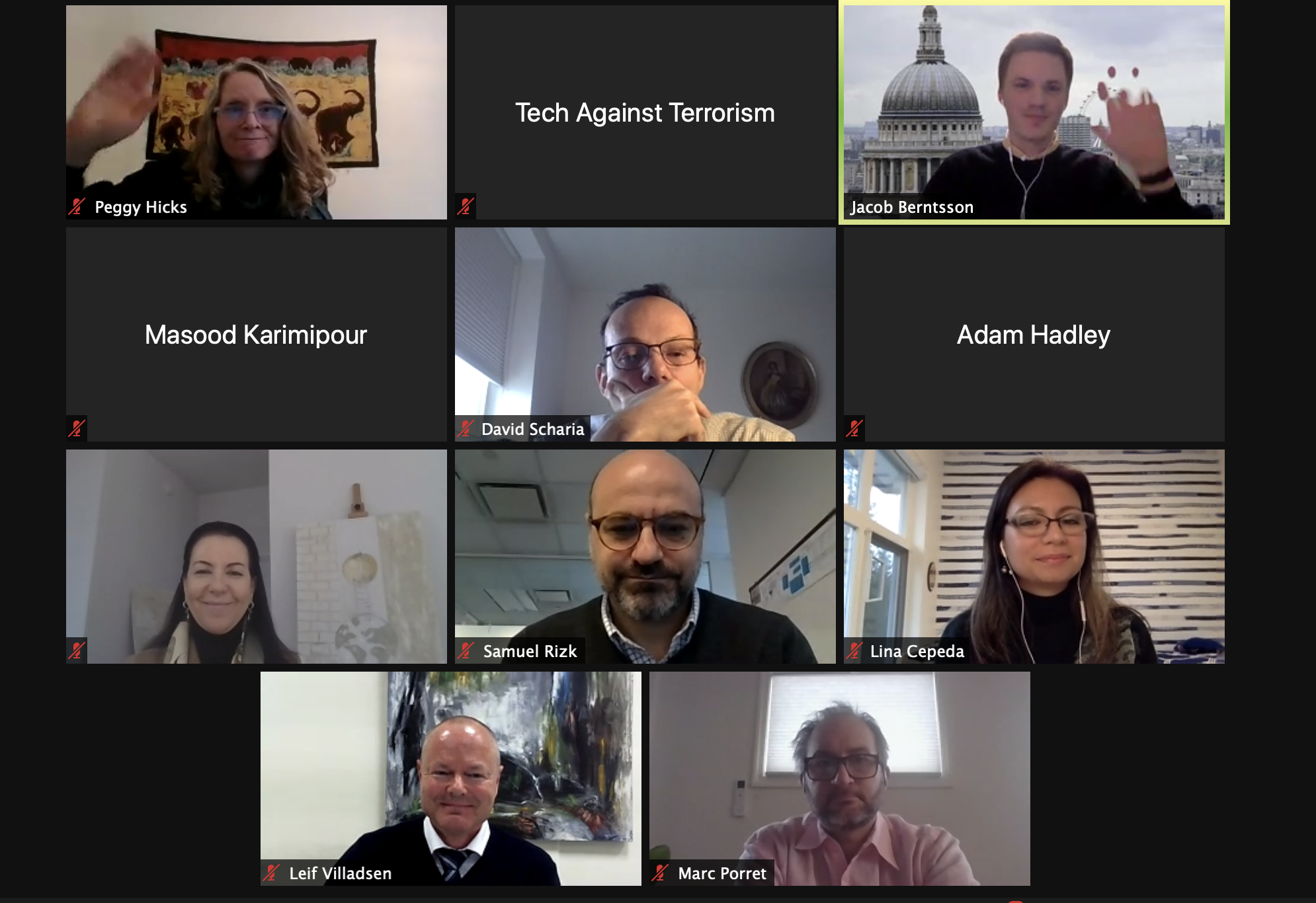 |
- On 16 December, we held our last webinar of 2020 exploring content moderation and alternatives to content removal. For this webinar, we welcomed Johannah Lowin and Sarah Kenny from the Global Internet Forum to Counter Terrorism (GIFCT), Alex Feerst, Advisor at the Trust and Safety Professional Association, Bill Ottman, CEO of Minds, and Rachel Wolbers, Public Policy Manager for the Facebook Oversight Board.
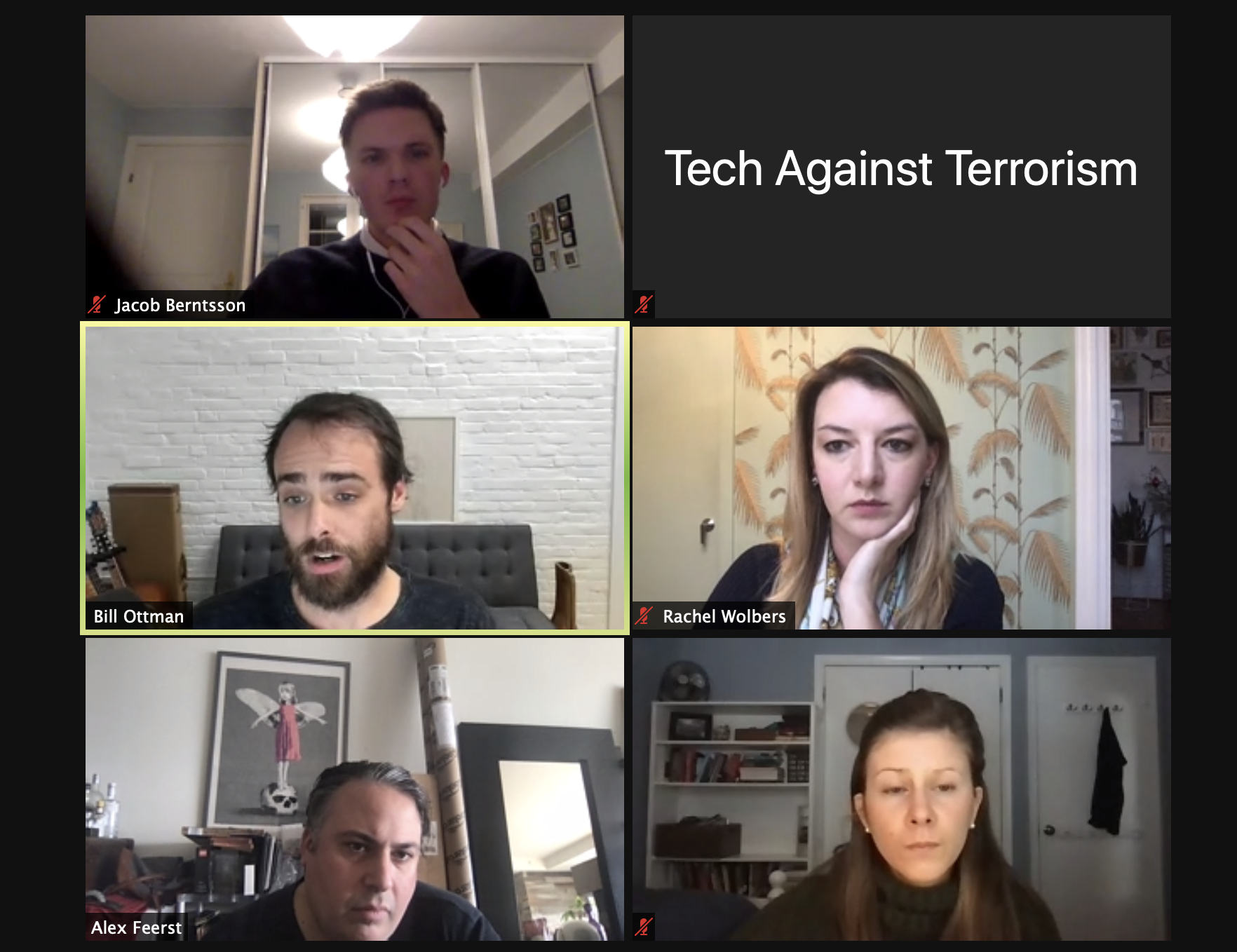 |
If you would like to access a recording of a webinar, you can reach out to us at contact@techagainstterrorism.org.
- In early December, we published our policy for inclusion of designated terrorist groups in the Terrorist Content Analytics Platform (TCAP). We also hosted our monthly office hours to update our stakeholders on the development of the platform.
- This month, Tech Against Terrorism launched a public survey on how online users and the general public perceive end-to-end encryption (E2EE), and the wider “encryption debate”. The survey is anonymous and still ongoing. We want to hear from you and would appreciate you taking a few minutes of your time to respond.
- On 18 December, our OSINT Analyst Arthur Bradley, presented on the novel digital terrorist modus operandi in the Middle East and North Africa Region at a workshop organised by the United Nations Office on Drugs and Crime (UNODC) for Lebanon on “The use of electronic evidence and sensitive intelligence in cross-border investigations of emerging terrorist threats”.
Media coverage
- Our Director, Adam Hadley, commented on behalf of our parent foundation the Online Harms Foundation on the newly announced UK regulatory framework for online harms, which sets out new guidelines for tech companies removal of terrorist and other “harmful” online content.
To learn more about the UK’s plans for regulating harmful online content, you can read our Online Regulation Series blogpost on the topic here.
What's up next
- The Tech Against Terrorism’s e-learning webinar series will continue in 2021, providing further insights into terrorist use of the internet and how tech companies can counter this threat whilst respecting human rights.
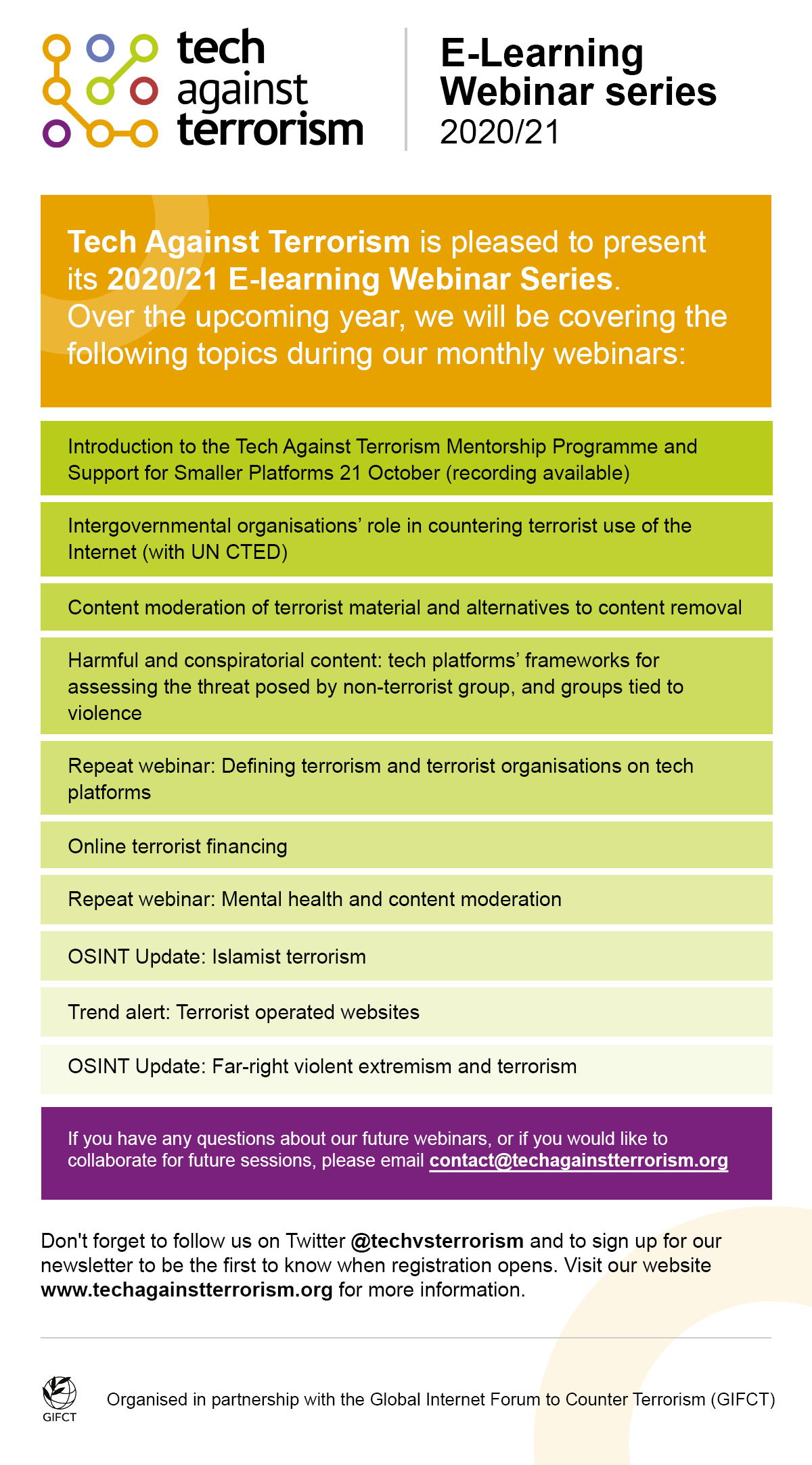 |
- The Online Regulation Series Handbook: To follow-up on our Online Regulation Series, we will be publishing a handbook collating all of our blogposts, additional analysis and recommendations, as well as a comprehensive list of all the resources needed to understand the fast-changing landscape of online regulation.
- In 2021, we will continue to support tech companies in countering terrorist use of the internet, improving transparency and accountability, and in raising awareness on the importance of public-private collaboration to tackle terrorist use of the internet whilst respecting human rights. Don't forget to follow us on Twitter to be the first to know when a webinar or new project is announced!
| Tech Against Terrorism Reader's Digest – 23 December Our weekly review of articles on terrorist and violent extremist use of the internet, counterterrorism, digital rights, and tech policy. |
Top stories:
- This week, a German court has sentenced the far-right violent extremist who killed two people last year in Halle, Germany, to life in prison.
- Discord has announced the formation of the “Discord Moderator Academy”, a resource that shares knowledge and insights on moderation, community management, and more.
- Poland’s Minister of Justice has announced a legal initiative aimed at preventing tech companies to remove or block content that is not illegal under Polish law, enabling internet users to file complaints against the removal of online posts. The initiative is also to create a special court for freedom of speech. Read more on this here.
- The International Centre for Counter-Terrorism (ICCT) has published a report on The Christchurch Attack Report: Key Takeaways on Tarrant’s Radicalization and Attack Planning. The ICCT has also published a report titled Mitigating the Impact of Media Reporting of Terrorism – Case Study of Government Communication during Westgate and DusitD2 Attacks.
Tech policy
- The Right Way to Regulate Digital Harms: David Kaye, former UN Special Rapporteur for Freedom of Opinion and Expression and Independent Board Chair of the Global Network Initiative (GNI), and Jason Pielemeier, Policy Director at the GNI, dwell on how international human rights law offers guiding principles for regulations seeking to counter the spread of “toxic content” online, including terrorist material. Kaye and Pielemeier develop on the principles of legality, legitimacy and necessity, which, respectively, supports the importance of clear definitions of what is lawful and unlawful, states that freedom of expression should only be limited for specific and compelling reasons, and finally that restrictions and regulations ought to be both tailored and proportionate to legitimate goals. Assessing, the EU’s proposed regulation on preventing the dissemination of terrorist content, they explain that it “misses the mark” by creating risks of barriers to innovation and of removal of acceptable content. Kaye and Pielemeier discuss the role of tech companies to support human rights, underlining that transparency, due process, accountability, and user appeals, are essential to support freedom of expression. They argue that companies should share as much public information as possible, and for government regulators to be “tasked with providing guidance for and oversight of content-moderation systems.” Kaye and Pielemeier conclude by underlining that any regulation aimed at countering online toxic content needs to be clear, comprehensive, and “based on human-rights principles”, to avoid “end[ing] up silencing the vulnerable”. (Kaye and Pielemeier, Project Syndicate, 21.12.2020)
Jason Pielemeir recently spoke on the topic of online regulation at our Online Regulation Series concluding webinar on “The State of Global Online Regulation.” If you would like to access a recording of a webinar, you can reach out to us at contact@techagainstterrorism.org.
To learn more about the EU proposed regulation on preventing the dissemination of terrorist content’s impact on tech platform, you can read our blogpost for Vox-Pol here.
Islamist terrorism
- Terrorism in Switzerland: No Western Country is Immune to Jihadist Threat: Guy Van Vlierden analyses the two recent, and first ever, Islamist terrorist attacks in Switzerland, respectively in Morges (September) killing one, and in Lugano (November) injuring two. Van Vlierden provides an overview of how the two attacks unfolded, and of the attackers’ connection with the Islamic State (IS). Both had tried to leave for Syria, while the attacker in Morges has been found to have been in contact with an IS network in Switzerland and France. Van Vlierden then continues on analysing Switzerland’s “relationship with Islam”, which “despite” bans on construction of minarets at the federal level, and on burqas in certain cantons, has not fallen into “into the crosshairs of the violent jihadist movement”, or at least not to the same level as neighbouring France. Instead, Vlierden focuses on how Islamist terrorist propaganda paints any Western country as a potential target, and on the threat represented by “failed travellers” whose frustration at not having been able to travel to Syria can be “an additional and powerful driver to act”. Finally, Van Vlierden dwells on the links between mental health issues and radicalisation (both perpetrators reportedly had mental health problems), which he argues can be a “valuable asset” for terrorist organisations considering any potential plot, successful or not, as with the case of IS. (Van Vlierden, European Eye on Radicalization, 16.12.2020)
- IntelBrief: Disrupted Shabaab Plot Demonstrates Continued Commitment to Large-Scale Attacks Globally: In this IntelBrief, the Soufan Center discusses a recently unsealed federal indictment detailing a foiled al-Shabaab terrorist plot to fly a plane into a building in the US. According to the Soufan Center, this foiled plot is evidence that al-Shabaab, and al-Qaeda by extension following al-Shabaab’s allegiance since 2012, remain committed to attacks involving commercial aviation. The IntelBrief notes that the foiled plot also highlights al-Qaeda’s continued interest in perpetrating attacks globally, especially to strike the US. Within East Africa, al-Shabaab has launched several high-profile attacks in recent years and therefore prior to this most recently foiled plot, many analysts considered al-Shabaab to be primarily focused on regional targets throughout the Horn of Africa, and counterterrorism attention has subsequently diminished. The Soufan Center cautions that with the impending drawdown of US troops in Somalia, recently ordered by President Trump, there are growing concerns that al-Shabaab will resurge and develop into an even more potent threat. They stress “it would be a grave mistake to dismiss the threat of al-Qaeda or its franchise groups” and that, “there are well-founded concerns that as Washington focuses on great power competition, its counterterrorism capabilities will atrophy, creating new opportunities for transnational terrorist groups”. (The Soufan Center, 21.12.2020)
Far-right violent extremism and terrorism
- She Called Police Over a Neo-Nazi Threat. But the Neo-Nazis Were Inside the Police: In this piece, Katrin Bennhold sheds light on the concerns of “far-right infiltration” in the German police. Bennhold focuses on the story of Ms. Basay-Yildiz, a German defense lawyer of Turkish descent who specialises in Islamist terrorism cases. Though Ms. Basay-Yildiz has become accustomed to threats from the far-right, this has become of greater concern recently due to threat which was signed with the initials of a former neo-Nazi terrorist group and included her personal address. Her personal address is not publicly available due to the earlier threats, indicating that whoever sent it had access to a database protected by the State, therefore exemplifying the issue of far-right extremism in Germany’s police. Bennhold writes that although policing was fundamentally overhauled in West Germany after the Second World War, the country “has been besieged by revelations of police officers in different corners of the country forming groups based on a shared far-right ideology”. This was demonstrated in the two-year parliamentary inquiry which concluded that far-right networks had penetrated German security services. In conclusion, Bennhold notes, “the spotlight is turning on Germany’s police, a much more sprawling and decentralised force with less stringent oversight than the military – and with a more immediate impact on the everyday safety of citizens, experts warn”. (Bennhold, The New York Times, 21.12.2020).
| For any questions or media requests, please get in touch via: contact@techagainstterrorism.org |
Background to Tech Against Terrorism
Tech Against Terrorism is an initiative supporting the global technology sector in responding to terrorist use of the internet whilst respecting human rights, and we work to promote public-private partnerships to mitigate this threat. Our research shows that terrorist groups - both jihadist and far-right terrorists - consistently exploit smaller tech platforms when disseminating propaganda. At Tech Against Terrorism, our mission is to support smaller tech companies in tackling this threat whilst respecting human rights and to provide companies with practical tools to facilitate this process. As a public-private partnership, the initiative works with the United Nations Counter Terrorism Executive Directorate (UN CTED) and has been supported by the Global Internet Forum to Counter Terrorism (GIFCT) and the governments of Spain, Switzerland, the Republic of Korea, and Canada.
